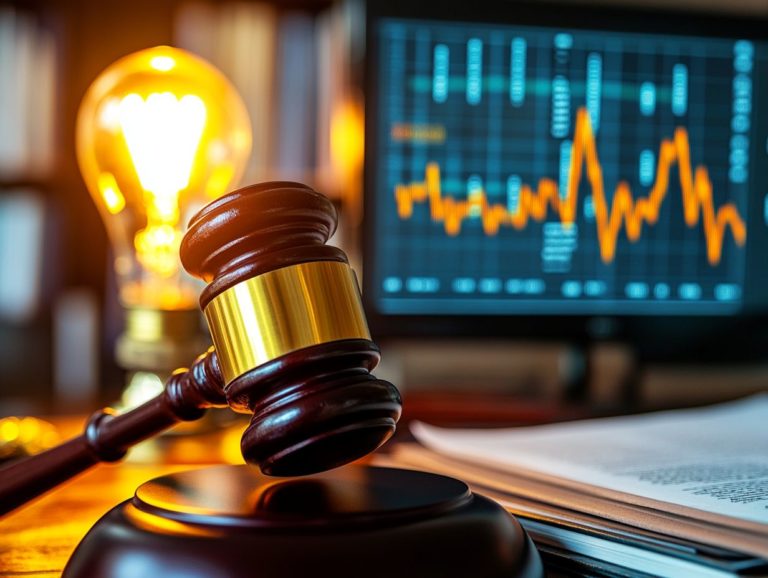The Future of IP Litigation Post-COVID-19
The COVID-19 pandemic has profoundly transformed the landscape of intellectual property (IP) litigation, presenting both challenges and fresh opportunities for you to navigate.
As courts adapt to new protocols and remote proceedings become standard practice, the focus of IP disputes is shifting to align with emerging technologies and evolving market demands.
This article delves into these significant changes, emphasizing the evolving court procedures, industry priorities, and the pivotal role technology plays in streamlining litigation.
Join us as we reveal exciting predictions for the future of IP litigation and the implications it holds for your legal practice.
Contents
- Key Takeaways You Can t Miss!
- The Impact of COVID-19 on IP Litigation
- Challenges and Opportunities for IP Litigation
- Navigating Remote Proceedings
- Addressing New Types of Intellectual Property Disputes
- The Role of Technology in the Future of IP Litigation
- Advancements in Virtual Hearings and Evidence Presentation
- Potential for Automation and Efficiency in Case Management
- Predictions for the Future of IP Litigation
- Frequently Asked Questions
- What is the impact of COVID-19 on IP litigation?
- Will there be a backlog of IP cases due to COVID-19?
- How will virtual hearings affect IP litigation?
- What changes can we expect in court procedures post-COVID-19?
- Will there be more focus on alternative dispute resolution methods?
- How can businesses protect their intellectual property during and after the pandemic?
Key Takeaways You Can t Miss!
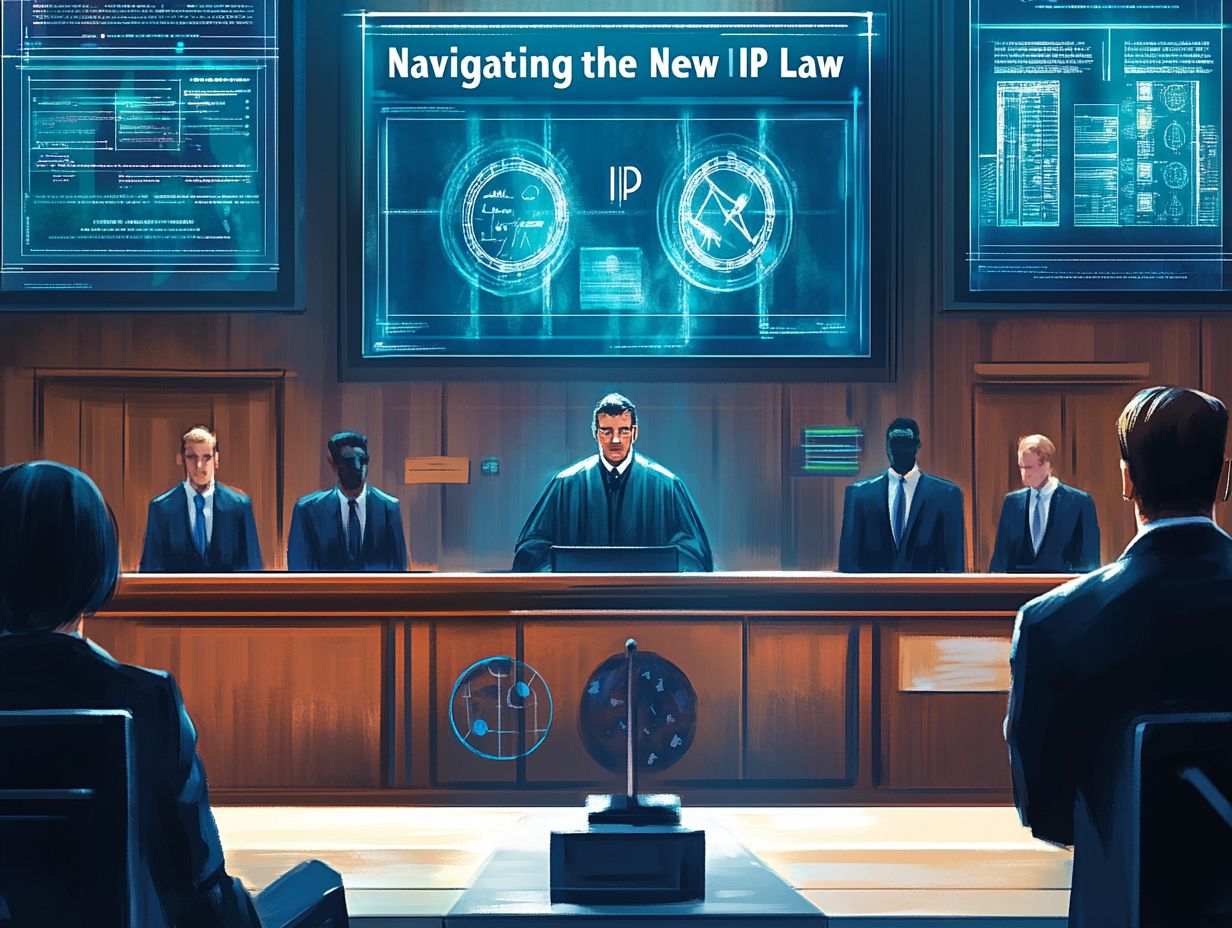
- The pandemic has changed IP litigation, affecting court procedures and creating new disputes.
- Remote proceedings bring both challenges and chances for more efficient litigation.
- The future of IP litigation is expected to see changes in legal strategies and outcomes, impacting the legal industry and job market.
The Impact of COVID-19 on IP Litigation
The COVID-19 pandemic has significantly transformed the realm of intellectual property (IP), particularly in the context of vaccine distribution and access to essential technologies.
As nations confront the pressing demands of public health, the tension between corporate monopolies and equitable vaccine access has ignited critical discussions in legal spheres and beyond. This situation underscores the urgent need for reform in IP practices.
The health crisis has sparked discussions about the TRIPS waiver, an agreement that allows countries to waive certain intellectual property protections during public health emergencies, and innovative frameworks that emphasize global justice and health equity. This invites a reevaluation of how we approach these vital issues.
Changes in Court Procedures and Filings
The COVID-19 pandemic has prompted significant shifts in court procedures and filings related to intellectual property rights, urging many jurisdictions to swiftly adapt to remote operations and digital submissions.
This abrupt transition has fundamentally transformed the landscape of IP litigation. Courts have embraced video conferencing tools and electronic filing systems, leading to enhanced efficiency and speed in legal proceedings.
However, this evolution brings with it concerns regarding the potential impacts on technology transfer. While remote hearings enhance accessibility, smaller businesses and innovators may face market disincentives or encounter obstacles in presenting their cases due to the absence of in-person interactions.
A noteworthy example during the pandemic was the successful remote hearing in a specific case, which set a precedent for future virtual IP disputes. This highlighted both the advantages and potential inequities introduced by this new approach.
Shifts in Industry Focus and Priorities
The pandemic has undeniably shifted your industry s focus and priorities, compelling pharmaceutical companies to innovate swiftly in vaccine distribution while wrestling with concerns about corporate monopolies and equitable access.
In response to this urgent global health crisis, many of these companies have accelerated their vaccine production timelines, prioritizing research and development like never before. This newfound urgency has fostered the creation of groundbreaking technologies and sparked a reevaluation of intellectual property strategies.
As you navigate the delicate balance between safeguarding innovations and ensuring broader public access, the role of public health organizations and international partnerships becomes increasingly vital. Collaborative efforts among nations and health authorities are now viewed as essential mechanisms for driving equitable distribution and advancing global health initiatives.
Challenges and Opportunities for IP Litigation
The landscape of IP litigation presents a myriad of challenges and opportunities, particularly when considering pandemic preparedness and health crisis response.
The experiences brought to light by COVID-19 have exposed critical flaws and highlighted areas ripe for potential reform.
As we look ahead, it s crucial to stay informed and proactive in adapting to these changing landscapes of IP litigation.
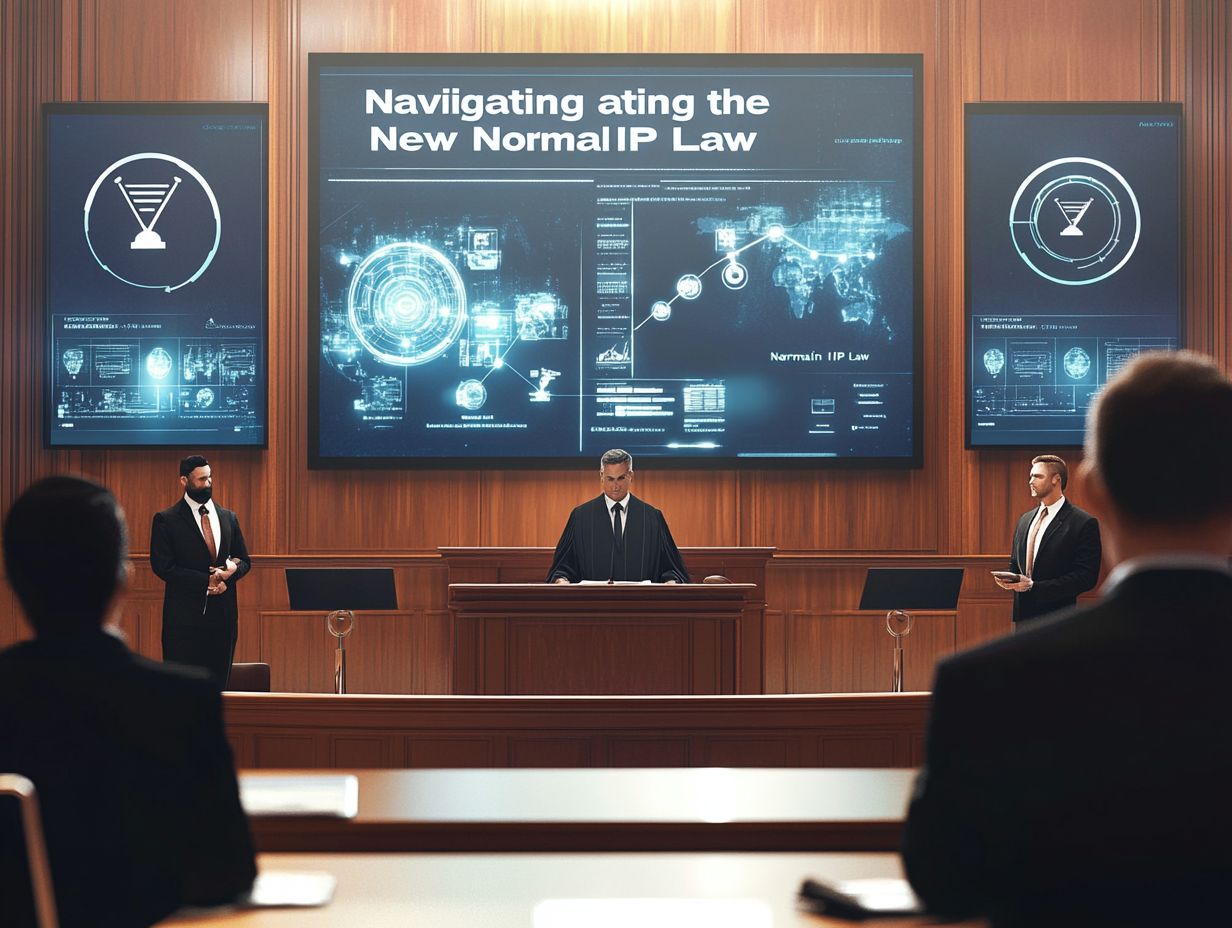
Managing remote proceedings in IP litigation is now essential due to COVID-19. This shift brings unique challenges and new opportunities for legal professionals.
These digital platforms streamline communication, but they also create challenges in the technology transfer process. The details of intellectual property can sometimes get lost in translation.
The role of cooperation between government and private companies in this evolving landscape is crucial for success. They enhance collaboration and provide vital resources and expertise that can help you manage remote procedures.
As a litigator, you need to adapt quickly. Leverage digital tools effectively while ensuring you maintain the integrity of advocacy. This approach helps you navigate the ever-changing digital landscape with confidence.
Addressing New Types of Intellectual Property Disputes
The pandemic has introduced a new era of intellectual property disputes, particularly around vaccine nationalism and its implications for health equity. These disputes show the tension between national interests and the urgent need for global collaboration in a shared health crisis.
When analyzing specific case studies, it’s clear that some nations stored vaccine supplies, prioritizing their populations while leaving others behind. This situation has sparked discussions about the ethical responsibilities of pharmaceutical companies and how international laws might need to adapt to promote global justice.
To ensure fair access to vaccines, it’s essential to rethink not only patent rights but also the mechanisms that support global health investments. We need a unified approach to prevent the same disparities in future health emergencies.
The Role of Technology in the Future of IP Litigation
Technology is set to transform IP litigation. Advancements in virtual hearings and automation will significantly improve efficiency and accessibility in legal proceedings.
Embracing these innovations enables you to navigate the complexities of the legal system with greater ease.
Advancements in Virtual Hearings and Evidence Presentation
Recent advancements in virtual hearings have changed how evidence is presented in IP litigation, offering greater flexibility and accessibility throughout the process. This shift is especially beneficial when public health concerns create barriers to traditional court procedures.
For example, during the pandemic, numerous intellectual property disputes were settled through virtual platforms. This allowed for the swift sharing of essential evidence without needing physical attendance.
One notable instance involved a pharmaceutical company where expert testimony was delivered via video conferencing. This approach facilitated an efficient review process that might have otherwise been delayed by health-related restrictions.
Such adaptations streamline proceedings and enhance participation for stakeholders who previously faced challenges accessing the justice system.
Potential for Automation and Efficiency in Case Management
The potential for automation in case management presents an excellent opportunity to boost efficiency in IP litigation, especially during health crises like COVID-19.
By streamlining workflow processes with automated tools, you can manage large caseloads without sacrificing quality. These innovative solutions enhance case tracking and provide real-time updates, fostering better communication among your team.
Collaboration becomes effortless when remote access features allow diverse groups to work together effectively, no matter their location.
As you navigate this evolving landscape, it’s essential that these automation tools remain adaptable, ensuring they can quickly respond to any future health emergencies while protecting the integrity of the IP system.
Predictions for the Future of IP Litigation
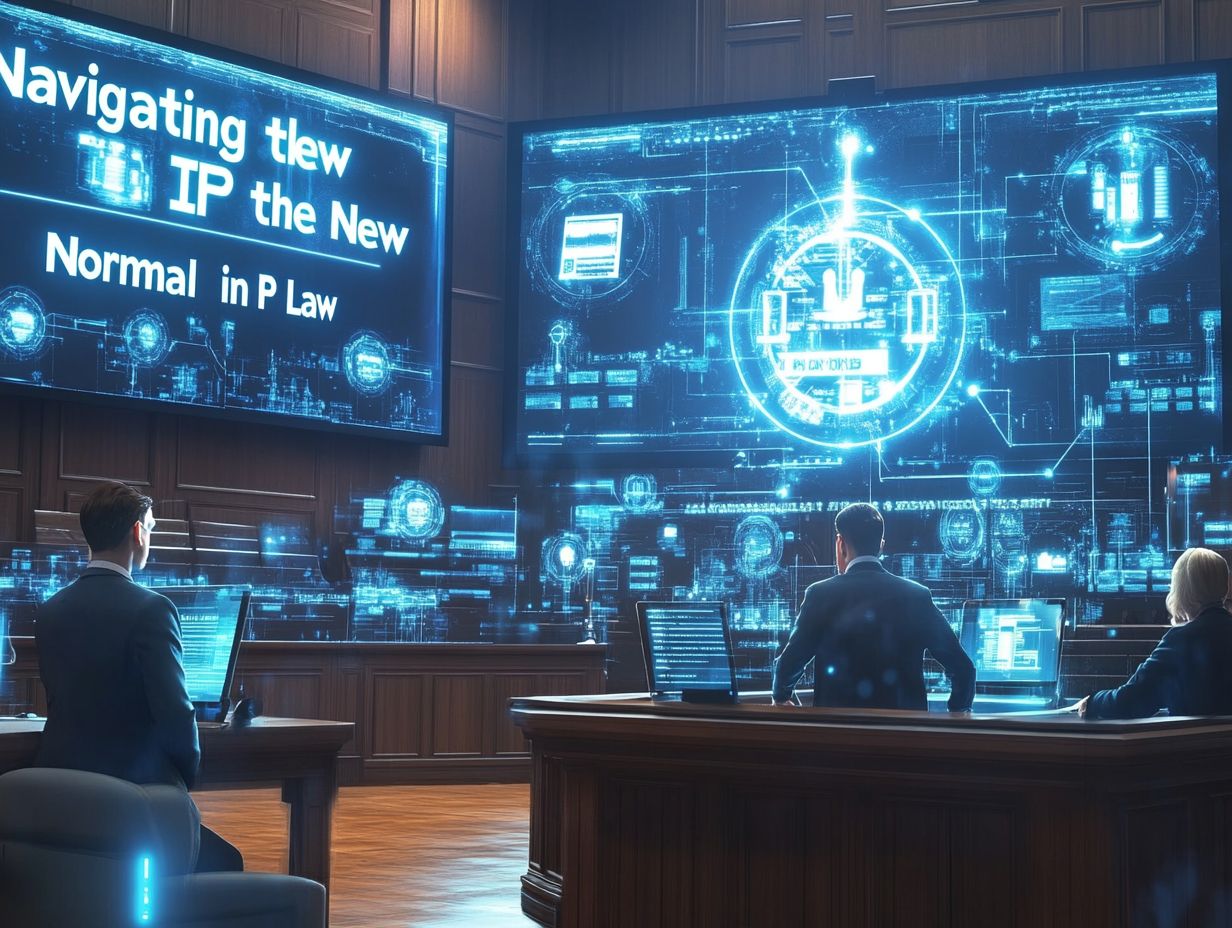
Expect major shifts in IP litigation strategies and outcomes. The COVID-19 pandemic has emphasized the need for health equity and better preparedness.
Possible Changes in Legal Strategies
IP litigation strategies are evolving dramatically. There’s a strong focus on ensuring vaccine access and combating monopolistic practices.
New legal frameworks may redefine patent protections. This drive for accessibility could limit patent exploitation by big pharmaceutical firms.
Such a shift promotes public health and social justice. It ensures marginalized communities receive necessary treatments without high costs.
Impact on the Legal Industry
The evolution of IP litigation will greatly affect the legal industry and job market. There is a rising demand for professionals with specialized knowledge.
Opportunities will grow for lawyers focused on health equity as organizations seek experts to navigate complex legal rights and public health needs.
Frequently Asked Questions
What is the impact of COVID-19 on IP litigation?
COVID-19 has caused delays and changes in court procedures, increasing reliance on technology for virtual hearings.
Will there be a backlog of IP cases due to COVID-19?
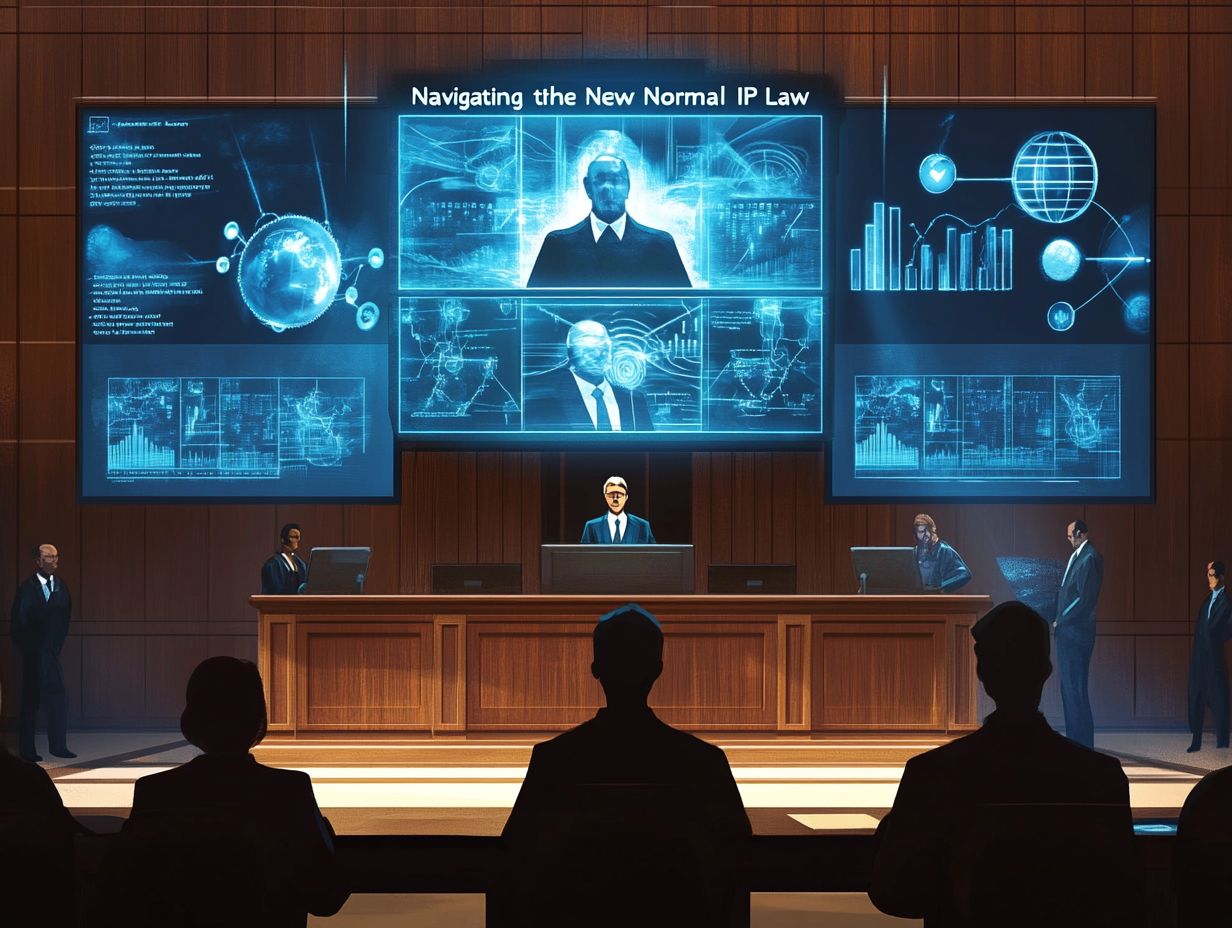
A backlog of IP cases is likely due to court closures. Courts are prioritizing urgent matters and using technology for remote proceedings.
How will virtual hearings affect IP litigation?
Virtual hearings are now more common and will likely continue. This can save costs and increase efficiency for all parties involved.
What changes can we expect in court procedures post-COVID-19?
Changes like electronic filing and remote hearings will likely remain. These innovations may lead to a smoother process for IP litigation.
Will there be more focus on alternative dispute resolution methods?
Given the backlog and potential delays, expect a greater emphasis on mediation and arbitration for IP disputes.
How can businesses protect their intellectual property during and after the pandemic?
Businesses should monitor for infringement, register their IP, and use mediation or arbitration when necessary. Having contingency plans for delays is also crucial.

